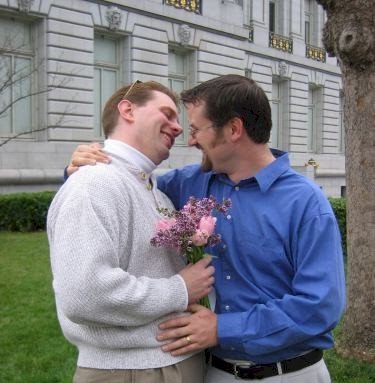 A new study attempts to gauge the percentage of gays and lesbians who have chosen to marry in places where that option is legal, with estimates ranging from as little as 2 percent to more than 16 percent, depending on the location.
A new study attempts to gauge the percentage of gays and lesbians who have chosen to marry in places where that option is legal, with estimates ranging from as little as 2 percent to more than 16 percent, depending on the location.A co-author of the report, released Wednesday, said both sides in the gay marriage debate may take heart from the findings.
The Institute for Marriage and Public Policy, which opposes gay marriage, reviewed data from the Netherlands, Belgium, Canada and Massachusetts, all of which allow same-sex partners to wed.
In each case, the study offered a range of estimates of the percentage of gays who had married, based on varying approximations - from 1 percent to 5 percent - of how many gays were in the general population.
In the Netherlands, where 8,127 same-sex couples married from April 1, 2001, through last December, the study said this represented between 2.6 percent and 6.3 percent of the country's gays and lesbians.
The study estimated that between 2 percent and 5 percent of Belgium's gays and lesbians, and 5.9 percent to 16.7 percent of those in Massachusetts had married. Same-sex marriage became legal in Massachusetts in May 2004, and 7,341 gay and lesbians couples had wed there through last December.
The institute study said calculations for Canada were difficult because the country allowed nonresidents to marry, but it estimated that as many as 14.3 percent of the gays and lesbians in the western province of British Columbia had married.
The report does not draw any major conclusions, saying it is too early to assess long-term trends.
"Whether same-sex marriage will emerge as commonplace or normative among gays and lesbians, or fade as time and novelty passes, cannot yet be determined," it said.
However, Maggie Gallagher, president of the Institute for Marriage and co-author of the study, said interpretations of the findings might vary according to one's views on gay marriage.
One faction, she said, might conclude that opposition to gay marriage was an overreaction given that seemingly modest numbers of people were choosing it. Another faction, she said, might look at the same numbers and contend that they did not justify overturning the long-standing concept of marriage as exclusively heterosexual.
"That's why the debate is so contentious," Gallagher said. "In one view, if you treat gay couples any differently, that's akin to racism. There's another view that there's something special about the unions of husbands and wives."
Gary Gates, a specialist in gay demography at the UCLA School of Law's Williams Institute, was given an advance look at the study. He disagreed with Gallagher's suggestion that relatively few gays and lesbians were opting for marriage.
Looking specifically at the Massachusetts data, and noting the limited time period of 20 months, he contended that a sharply higher percentage of gays and lesbians were deciding marry than heterosexuals of marrying age.
"Numerically, same-sex couples will never comprise a major portion of the married population," Gates said in a telephone interview. "But gay people do seem to be really interested in getting married - it's kind of a compliment to the institution of marriage."
from The Examiner
No comments:
Post a Comment